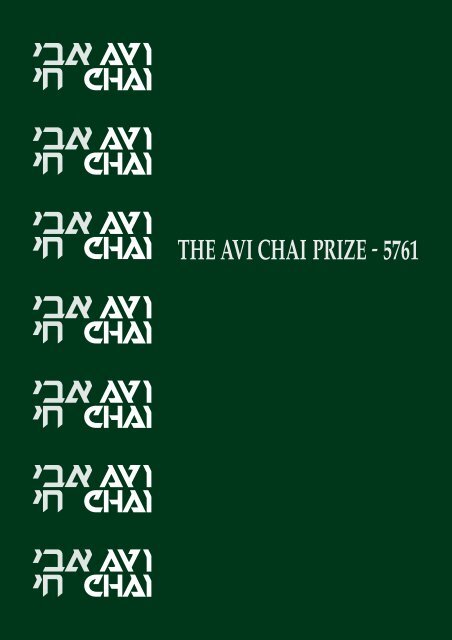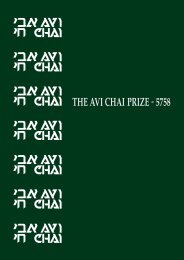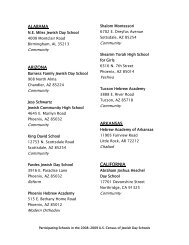5761: Professor Ruth Gavison and Rabbi Yakov Medan - Avi Chai
5761: Professor Ruth Gavison and Rabbi Yakov Medan - Avi Chai
5761: Professor Ruth Gavison and Rabbi Yakov Medan - Avi Chai
Create successful ePaper yourself
Turn your PDF publications into a flip-book with our unique Google optimized e-Paper software.
THE AVI CHAI PRIZE ≠ <strong>5761</strong>
BOARD OF TRUSTEES<br />
Arthur W. Fried, <strong>Chai</strong>rman<br />
Mem Dryan Bernstein<br />
Meir Buzaglo<br />
<strong>Avi</strong>tal Darmon<br />
Alan R. Feld<br />
Lauren K. Merkin<br />
George Rohr<br />
Lief D. Rosenblatt<br />
David E. Tadmor<br />
Henry Taub<br />
<strong>Ruth</strong> R. Wisse<br />
EXECUTIVE DIRECTORS<br />
Eli Silver (ISRAEL)<br />
Yossi Prager (USA)<br />
AVI CHAI Prize Coordinator<br />
Ita Shapiro Haber<br />
Israel<br />
31 Hanevi’im Street<br />
95103 Jerusalem<br />
Phone: 02-624-3330 Fax: 02-624-3310<br />
e-mail: office@avichai.org.il<br />
USA<br />
52 V<strong>and</strong>erbilt Avenue<br />
New York, NY 10017-3808<br />
Phone: 212-697-8836 Fax: 212-697-8879<br />
e-mail: avichaina@aol.com
A Commitment to the Jewish People, Judaism,<br />
<strong>and</strong> the State of Israel<br />
AVI CHAI’s primary goals are to encourage mutual underst<strong>and</strong>ing <strong>and</strong><br />
sensitivity among Jews of different religious backgrounds <strong>and</strong> to increase<br />
underst<strong>and</strong>ing <strong>and</strong> appreciation of Jewish traditions, customs, <strong>and</strong> laws.<br />
Some programs in Israel currently supported by AVI CHAI are:<br />
* Tzav Pius: a broad public campaign to encourage mutual underst<strong>and</strong>ing<br />
among Israeli Jews. The campaign calls for affirmation of the principles:<br />
“We respect Jewish tradition; we safeguard democracy.” Tzav Pius initiates<br />
<strong>and</strong> supports a variety of educational <strong>and</strong> community-related projects.<br />
* Keshet School of Jerusalem: now kindergarten through tenth grade, with<br />
plans to develop through high school. Keshet embodies a learning community<br />
of students from religious <strong>and</strong> secular backgrounds, committed to respect<br />
for religious differences. Amutat Keshet has initiated a program to encourage<br />
the opening nationwide of additional schools in the spirit of Keshet.<br />
* Beit Morasha of Jerusalem: trains educational leaders, men <strong>and</strong> women,<br />
to address the needs of contemporary Israeli society. The educational program<br />
integrates both yeshiva <strong>and</strong> academic approaches to Jewish scholarship.<br />
* Yahalom: a program aimed at bringing together parents <strong>and</strong> children to<br />
study Jewish texts, within the framework of state elementary schools. Yahalom<br />
has exp<strong>and</strong>ed its scope of activity from schools with significant immigrant<br />
populations to those with a more “veteran” population.<br />
* Kolot: an intensive year-long program of Jewish learning for leaders in<br />
business, media, <strong>and</strong> other professions.<br />
* Revivim: a teacher training program to revitalize Jewish studies in state<br />
high schools, implemented by the Hebrew University of Jerusalem. The<br />
four-year program is offered to exceptional university students, who will<br />
receive a Masters degree in Jewish studies.<br />
* Tzohar: rabbis dedicated to revitalizing the role of the rabbinate in Israeli<br />
society by engaging in meaningful dialogue with the secular world. Tzohar’s<br />
activity began with halachic weddings adapted for secular couples. For the<br />
past three years, Tzohar has trained a cadre of young community rabbis to<br />
serve the entire spectrum of Jewish residents in their communities. Tzohar<br />
is now developing a training program for madrichot kallot (pre-marital<br />
instruction for brides).<br />
* Open Batei Midrash: a training program implemented in partnership with<br />
Beit Midrash Elul. Facilitators <strong>and</strong> potential coordinators receive intensive<br />
training at Elul <strong>and</strong> accept responsibility to establish open batei midrash for<br />
the study of Judaism in their home community.
* The Center for Jewish Education in the Public School System: a group<br />
of high schools connected with the Shalom Hartman Institute in a<br />
comprehensive framework that includes: a year-long curriculum for principals;<br />
a three-year program for training teachers in Jewish studies instruction; <strong>and</strong><br />
pedagogic support for the teachers in building <strong>and</strong> implementing Jewish<br />
studies curricula in their schools.<br />
* Parshat HaShavuah: exposes students in state junior high schools to the<br />
weekly Torah portion. The curriculum enables pupils to become familiar<br />
with perspectives relating to Jewish tradition <strong>and</strong> culture <strong>and</strong> to become<br />
acquainted with texts from the classical “Jewish bookshelf,” while linking<br />
the relevant issues to their own world. The project, piloted in Jerusalem in<br />
partnership with the Jerusalem Educational Authority, is exp<strong>and</strong>ing to<br />
additional areas of the country.<br />
* AVI CHAI Siddur: a user-friendly <strong>and</strong> readable siddur published in two<br />
volumes for the home <strong>and</strong> Shabbat, for Israelis with little or no background<br />
in its contents. The siddur is now in its third printing <strong>and</strong> has sold over<br />
10,000 copies.<br />
* Alma Hebrew College: a liberal arts center in Tel <strong>Avi</strong>v for the study of<br />
Hebrew culture <strong>and</strong> contemporary Jewish identity.<br />
* Talmudic Institute for Women: a three-year program of advanced Jewish<br />
learning at MaTaN. The program is intended to develop a cadre of female<br />
scholars able to reach the summit of Talmudic <strong>and</strong> halachic scholarship.<br />
* Pre-army Mechinot: the Foundation supports four such frameworks around<br />
the country, with the goal of fostering the Jewish <strong>and</strong> Zionist commitment<br />
of youth while preparing them for their army service.<br />
* Research: AVI CHAI has funded a follow-up to the 1993 Guttman study,<br />
“Beliefs, Observances <strong>and</strong> Social Interaction Among Israeli Jews,” to be<br />
completed by the end of the year 2001. The Foundation also is funding a<br />
feasibility study to explore possible educational frameworks for the population<br />
of “traditional” Jews in Israel.<br />
* Sabbaticals: during <strong>5761</strong> (the 2001/02 academic year), the Foundation will<br />
fund sabbaticals for four professionals involved in the Foundation’s fields<br />
of interest, in order to advance their professional <strong>and</strong> personal development.<br />
Three professionals qualified <strong>and</strong> took sabbaticals during 5760, <strong>and</strong> we will<br />
continue to offer this program in the future.<br />
AVI CHAI also works to promote its goals through a variety of projects in<br />
North America.
The AVI CHAI Prize<br />
The AVI CHAI Prize is being awarded for the ninth year.<br />
The aim of the Prize is to recognize <strong>and</strong> reward individuals who contribute<br />
toward increasing mutual underst<strong>and</strong>ing <strong>and</strong> sensitivity among Israeli Jews<br />
of different backgrounds <strong>and</strong> commitments to Jewish heritage.<br />
The Prize may be conferred on any individual resident of Israel (the Prize<br />
is not awarded to an institution, organization, or any other public body)<br />
who has made a significant, ongoing or innovative contribution to creating<br />
a bridge between Jews with different approaches to tradition, <strong>and</strong> whose<br />
activities stem from an approach of underst<strong>and</strong>ing <strong>and</strong> appreciation for the<br />
various facets of Jewish life.<br />
The Prize Committee is composed of eight people of public stature in Israeli<br />
society who represent a broad spectrum of approaches to Jewish tradition.<br />
The AVI CHAI Prize - <strong>5761</strong> is in the amount of NIS 75,000 to each recipient.<br />
The AVI CHAI Prize - 5753 was awarded to Dr. Daniel Tropper, initiator<br />
<strong>and</strong> founder of GESHER. GESHER’s goal is to bring together students of<br />
different orientations to Jewish tradition in order to strengthen their Jewish-<br />
Zionist identity <strong>and</strong> nurture respect between religious <strong>and</strong> secular.<br />
The AVI CHAI Prize - 5754 was awarded to the late Arieh Ben-Gurion,<br />
founder of the Kibbutz Institute for Festivals <strong>and</strong> Holidays. The Institute<br />
seeks to integrate Jewish tradition within kibbutz life <strong>and</strong> to foster innovative<br />
Jewish cultural models for the kibbutz <strong>and</strong> all of Israel.<br />
The AVI CHAI Prize - 5755 was awarded to Dr. Zvi Zameret, Director of<br />
Yad Itzhak Ben-Zvi. Dr. Zameret’s career <strong>and</strong> life provide a personal example<br />
of the successful dialogue between Jews of different religious backgrounds,<br />
<strong>and</strong> his actions foster respect for, <strong>and</strong> knowledge of, Jewish tradition in all<br />
sectors of Israeli society.<br />
The AVI CHAI Prize - 5756 was awarded to <strong>Rabbi</strong> Menachem Fruman for<br />
his many initiatives to increase underst<strong>and</strong>ing <strong>and</strong> sensitivity, <strong>and</strong> his<br />
continuing search for a common language with which to develop respectful<br />
co-existence between all sectors of the Jewish people. His approach inspired<br />
the formation of Tekoa, where residents with different Jewish lifestyles live<br />
<strong>and</strong> study together with mutual respect <strong>and</strong> openness.<br />
The AVI CHAI Prize - 5757 was awarded to Ms. <strong>Ruth</strong> Calderon Ben-<br />
Shachar <strong>and</strong> to Mr. Moti Bar-Or for their joint initiative in the establishment<br />
of Beit Midrash Elul in Jerusalem. They developed a communal learning<br />
method where men <strong>and</strong> women of different approaches to religion <strong>and</strong><br />
tradition learn to study together with respect, cooperation, <strong>and</strong> tolerance.<br />
Today, Elul serves as a model <strong>and</strong> source of inspiration for communal learning<br />
frameworks for religious <strong>and</strong> secular around the country.<br />
The AVI CHAI Prize - 5758 was awarded to <strong>Professor</strong> Avraham Shapira<br />
of Tel <strong>Avi</strong>v University for his efforts to educate the kibbutz movement <strong>and</strong><br />
the general public in the Jewish cultural heritage. By virtue of his numerous<br />
spiritual, cultural, <strong>and</strong> educational endeavors, Prof. Shapira has demonstrated<br />
that differences of belief <strong>and</strong> conviction can be bridged <strong>and</strong> that dialogue<br />
between people of different approaches to religion can be fostered.
The AVI CHAI Prize - 5759 was awarded to Mrs. Tova Ilan for her diverse<br />
educational activities, which culminated in the establishment of the Yaacov<br />
Herzog Center for Jewish Studies ten years ago <strong>and</strong> her work as its director<br />
since its founding. Mrs. Ilan’s educational activities represent a model of<br />
how to conduct study <strong>and</strong> dialogue in a multicultural society such as Israel.<br />
The AVI CHAI Prize - 5760 was awarded to <strong>Rabbi</strong> <strong>Professor</strong> David Hartman<br />
for his life’s work as an educator, philosopher, <strong>and</strong> writer, especially his<br />
founding <strong>and</strong> directing of the Shalom Hartman Institute in Jerusalem.<br />
<strong>Professor</strong> Hartman’s rare combination of thought <strong>and</strong> action serve as a model<br />
of an uncompromising quest for tolerance, for listening to the other, <strong>and</strong> for<br />
fostering an underst<strong>and</strong>ing <strong>and</strong> appreciation of the Jewish heritage.<br />
THE AVI CHAI PRIZE COMMITTEE<br />
Menachem Fisch, <strong>Chai</strong>rman<br />
<strong>Professor</strong> of History <strong>and</strong> Philosophy of Science, Tel-<strong>Avi</strong>v University;<br />
Senior Fellow at the Shalom Hartman Institute for Advanced Judaic Studies<br />
Nurit Altuvia<br />
Yaira Amit<br />
<strong>Professor</strong> of Biblical Studies <strong>and</strong> <strong>Chai</strong>r of Bible Teaching Program at<br />
Tel-<strong>Avi</strong>v University<br />
Yaakov Haddany<br />
Director, The E.M. Liphshitz College<br />
Benny Lau<br />
Director, Women’s Beit Midrash, Beit Morasha of Jerusalem;<br />
<strong>Rabbi</strong> of Himmelfarb Torani High School<br />
Eliezer Shmueli<br />
<strong>Chai</strong>rman, The Society for Advancement of Education in Israel<br />
David Tadmor<br />
Trustee, THE AVI CHAI FOUNDATION<br />
Eitan Yefenof<br />
<strong>Professor</strong> <strong>and</strong> <strong>Chai</strong>rman, The Lautenberg Center for General <strong>and</strong> Tumor<br />
Immunology, The Hebrew University-Hadassah Medical School
The AVI CHAI Prize - <strong>5761</strong> is awarded to <strong>Professor</strong> <strong>Ruth</strong> <strong>Gavison</strong> <strong>and</strong><br />
<strong>Rabbi</strong> <strong>Yakov</strong> <strong>Medan</strong> for their proposed “Foundation for a New Social Pact<br />
between Religious <strong>and</strong> Secular Jews in Israel.”<br />
For the past two years, Prof. <strong>Gavison</strong> <strong>and</strong> <strong>Rabbi</strong> <strong>Medan</strong> have been engaged<br />
in a dynamic, in-depth dialogue about the main controversies between<br />
religious <strong>and</strong> secular Jews in Israel, motivated by a sense of public<br />
responsibility <strong>and</strong> deep inner conviction. Underlying their work are basic<br />
principles that both accept: the importancy of assuring the viability of Israel<br />
as a Jewish <strong>and</strong> democratic state <strong>and</strong> the need to minimize government<br />
intervention with regard to how individuals conduct their lives with respect<br />
to religious observance. Hence, they both believe that an agreed-upon political<br />
<strong>and</strong> legal framework must allow for the full expression of a variety of<br />
identities <strong>and</strong> ways of life, while maintaining the Jewish character of the<br />
state.<br />
The initial proposals drawn up by Prof. <strong>Gavison</strong> <strong>and</strong> <strong>Rabbi</strong> <strong>Medan</strong> were<br />
discussed at the Shalom Hartman Institute by a review panel comprising<br />
thinkers <strong>and</strong> public figures from across the spectrum. During 2000/01,<br />
following these discussions, the first edition of the “Foundation for a New<br />
Social Pact between Religious <strong>and</strong> Secular Jews in Israel” was completed,<br />
with support from the Yitzhak Rabin Center for Israel Studies, <strong>and</strong> it is now<br />
being discussed in a variety of frameworks <strong>and</strong> public forums.<br />
The collaboration between Prof. <strong>Gavison</strong> <strong>and</strong> <strong>Rabbi</strong> <strong>Medan</strong> was conceived,<br />
coordinated, <strong>and</strong> aided from the start by Yisrael Harel.<br />
The very thorough <strong>and</strong> broad-based work of Prof. <strong>Gavison</strong> <strong>and</strong> <strong>Rabbi</strong> <strong>Medan</strong><br />
has resulted in detailed proposals intended to serve as a basis for a new<br />
relationship between religion <strong>and</strong> state in Israel. Their effort to bridge the<br />
deepest chasm existing in Israeli Jewish society, based on respect <strong>and</strong><br />
sensitivity for the fundamental commitments of the different segments of<br />
the population, is exemplary in its scope <strong>and</strong> thoroughness. Their important<br />
work has the potential to make a weighty contribution to determining Israel’s<br />
future as a Jewish <strong>and</strong> democratic state.<br />
The Prize Committee
<strong>Professor</strong> <strong>Ruth</strong> <strong>Gavison</strong><br />
<strong>Professor</strong> <strong>Ruth</strong> <strong>Gavison</strong> was born in Jerusalem in 1945 <strong>and</strong> resides there<br />
today.<br />
She is a professor in the Faculty of Law at the Hebrew University of Jerusalem,<br />
where she holds the Haim H. Cohn <strong>Chai</strong>r for Human Rights, <strong>and</strong> is a senior<br />
fellow of the Israel Democracy Institute.<br />
Prof. <strong>Gavison</strong> has an LL.B. (with distinction), an LL.M. (with special<br />
distinction) <strong>and</strong> a B.A. in philosophy <strong>and</strong> economics, all from the Hebrew<br />
University. She earned a D.Phil. in legal philosophy from Oxford University<br />
in 1975.<br />
Prof. <strong>Gavison</strong> was a visiting professor at Yale Law School (1978—1980) <strong>and</strong><br />
at the USC Law Center (1990—1992). In 1998—1999, she was a Lawrence<br />
Rockefeller Fellow at the Center for Human Values at Princeton University.<br />
Prof. <strong>Gavison</strong> was among the founders of the Association for Civil Rights<br />
in Israel (ACRI) in 1974. She served as its chair for many years <strong>and</strong> was its<br />
president from 1996 to 1999. Since 1998 she has been a member of the<br />
International Commission of Jurists. She is also a member of the presidium<br />
of the Yachad Council.<br />
Her fields of research <strong>and</strong> teaching include the philosophy of law, human<br />
rights, Israeli society, <strong>and</strong> the role of laws <strong>and</strong> courts in divided democracies.<br />
At the Israel Democracy Institute she deals with mapping <strong>and</strong> bridging the<br />
central schisms in Israeli society.<br />
<strong>Ruth</strong> <strong>Gavison</strong> has one son.<br />
<strong>Rabbi</strong> <strong>Yakov</strong> <strong>Medan</strong><br />
<strong>Rabbi</strong> <strong>Medan</strong> was born in Jerusalem in 1950 <strong>and</strong> has been a resident of Alon<br />
Shvut in Gush Etzion since its founding in 1970.<br />
Since 1976, he has taught at the Har Etzion hesder yeshiva in Alon Shvut,<br />
including in its rabbinical training program, <strong>and</strong> has taught Bible <strong>and</strong> Jewish<br />
philosophy at the Yaacov Herzog Center for Jewish Studies, which is affiliated<br />
with the yeshiva. <strong>Rabbi</strong> <strong>Medan</strong> also teaches in various colleges, including<br />
Michlelet Bayit Vegan in Jerusalem, Yiud, Efrata, Midreshet Lindenbaum,<br />
Midreshet Migdal Oz, Yeshivat Or Etzion, Sha’alvim, Yeroham <strong>and</strong> the<br />
Midrasha for Women at Bar-Ilan University.<br />
<strong>Rabbi</strong> <strong>Medan</strong> is the editor of Megadim, the Bible journal of the Yaacov Herzog<br />
Center, <strong>and</strong> has published hundreds of articles in a variety of periodicals<br />
<strong>and</strong> journals–mainly religious publications–on Talmud, Bible, Jewish<br />
philosophy, <strong>and</strong> Eretz Israel.<br />
<strong>Rabbi</strong> <strong>Medan</strong>’s public activity includes membership in the national<br />
administration of Bnei Akiva, membership on the board of the Joint Institute<br />
for Jewish Studies (the joint conversion-preparation school recommended<br />
by the Neeman Commission), <strong>and</strong> membership on the YESHA Council<br />
(Council of Jewish Communities in Judea, Samaria, <strong>and</strong> Gaza).<br />
<strong>Yakov</strong> <strong>Medan</strong> <strong>and</strong> his wife Rutie are the parents of seven children.




